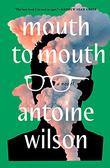Episode 250: Antoine Wilson, author of Mouth to Mouth (Avid Reader Press), has a pet theory about why novels are more popular than short story collections:
 “The thing that’s tricky about short stories—and I love short stories—is each story you begin, you have to build that world from scratch. But a novel, you return to the world that you’ve been creating along the way. I think there’s just more of an action potential? More of a hump to get over at the beginning of anything. So a collection of short stories, to some, maybe subconsciously, looks like a series of those humps that requires more reader energy.”
“The thing that’s tricky about short stories—and I love short stories—is each story you begin, you have to build that world from scratch. But a novel, you return to the world that you’ve been creating along the way. I think there’s just more of an action potential? More of a hump to get over at the beginning of anything. So a collection of short stories, to some, maybe subconsciously, looks like a series of those humps that requires more reader energy.”
Episode 251: Gwen E. Kirby, author of Shit Cassandra Saw (Penguin), whose experience reading the slush pile of a popular literary journal helped inspire a story in her collection:
 “One of the things I noticed was a lot of stories had women in them that would just sort of show up, the male protagonist would notice her bosom, she would say something helpful, and then she would never be heard from again. And the man would go on with his hero’s journey to get divorced, or whatever it was he was going to do at the end of the story. [Once] I was at a reading, and this guy was reading his story, and there was a character whom he just called “Midwestern girl”—the whole story—and I just was like, what?…So, as you know, then I wrote a story in the collection called “Midwestern Girl Is Tired of Appearing in Your Short Stories,” where, basically, the walking aide to the hero becomes sentient and takes over the narrative for herself.”
“One of the things I noticed was a lot of stories had women in them that would just sort of show up, the male protagonist would notice her bosom, she would say something helpful, and then she would never be heard from again. And the man would go on with his hero’s journey to get divorced, or whatever it was he was going to do at the end of the story. [Once] I was at a reading, and this guy was reading his story, and there was a character whom he just called “Midwestern girl”—the whole story—and I just was like, what?…So, as you know, then I wrote a story in the collection called “Midwestern Girl Is Tired of Appearing in Your Short Stories,” where, basically, the walking aide to the hero becomes sentient and takes over the narrative for herself.”
Episode 253: Jessamine Chan, author of The School for Good Mothers (Simon & Schuster), on taking pleasure in the editing process:
 “I’ve spent my entire professional life as an editor: I worked at the University of Chicago for most of my 20s; then I was working in the lit mag in grad school; and then I worked at [Publishers Weekly], where the whole job was cutting the text down to these teeny tiny capsule reviews. So I really take a lot of pleasure in making sure that there’s no excess in the prose. One of my teachers—Percival Everett—who saw the very early draft of the project—when I was still envisioning it as a really complicated short story, at the time—he referred to the prose as “deceptively simple.” And I think that [propulsive] “rolling along” quality happens because of editing choices.”
“I’ve spent my entire professional life as an editor: I worked at the University of Chicago for most of my 20s; then I was working in the lit mag in grad school; and then I worked at [Publishers Weekly], where the whole job was cutting the text down to these teeny tiny capsule reviews. So I really take a lot of pleasure in making sure that there’s no excess in the prose. One of my teachers—Percival Everett—who saw the very early draft of the project—when I was still envisioning it as a really complicated short story, at the time—he referred to the prose as “deceptively simple.” And I think that [propulsive] “rolling along” quality happens because of editing choices.”
Megan Labrise is the editor at large and host of Kirkus’ Fully Booked podcast. Find new episodes every Tuesday on Apple Podcasts and Spotify or at kirkusreviews.com/podcast.



































